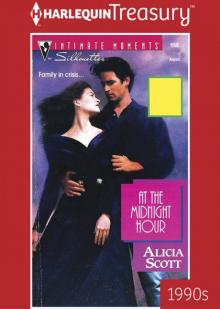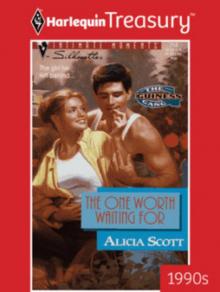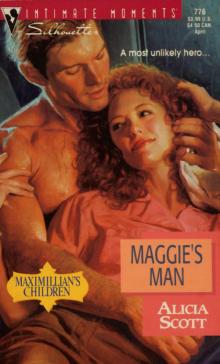- Home
- Alicia Scott
Marrying Mike...Again
Marrying Mike...Again Read online
“I’ve spent four long years getting you out of my system, Mike,” Sandra whispered hoarsely, her eyes glistening with tears. “I don’t want you back. I can’t afford to have you back.”
“Why not?” he rasped, the taste of her still on his lips. “You felt it, too—”
“Of course I felt it! Passion was never our problem, Mike. You could look at me and I’d burst into flames. But what about outside the bedroom? What about real life?”
“Sandra, what do you want from me?”
“I don’t know. I…just… I want you to go home.”
“Fine,” he said savagely. Blood was still pounding in his veins. He was angry. And confused. Then he looked at Sandra, and desire took over again.
He took a step forward. She cut him off.
“You walked away easily enough once before, Mike,” she said. “Don’t tell me you can’t do it now….”
Dear Reader,
Happy New Year! Silhouette Intimate Moments is starting the year off with a bang—not to mention six great books. Why not begin with the latest of THE PROTECTORS, Beverly Barton’s miniseries about men no woman can resist? In Murdock’s Last Stand, a well-muscled mercenary meets his match in a woman who suddenly has him thinking of forever.
Alicia Scott returns with Marrying Mike… Again, an intense reunion story featuring a couple who are both police officers with old hurts to heal before their happy ending. Try Terese Ramin’s A Drive-By Wedding when you’re in the mood for suspense, an undercover agent hero, an irresistible child and a carjacked heroine who ends up glad to go along for the ride. Already known for her compelling storytelling abilities, Eileen Wilks lives up to her reputation with Midnight Promises, a marriage-of-convenience story unlike any other you’ve ever read. Virginia Kantra brings you the next of the irresistible MacNeills in The Comeback of Con MacNeill, and Kate Stevenson returns after a long time away, with Witness…and Wife?
All six books live up to Intimate Moments’ reputation for excitement and passion mixed together in just the right proportions, so I hope you enjoy them all.
Yours,
Leslie J. Wainger
Executive Senior Editor
MARRYING MIKE… AGAIN
ALICIA SCOTT
To my grandfather,
Virgil Chadwick, for all the rides in the red pickup truck.
I miss you, Grandpa.
Books by Alicia Scott
Silhouette Intimate Moments
Walking After Midnight #466
Shadow’s Flame #546
Waking Nightmare #586
*At the Midnight Hour #658
*Hiding Jessica #668
*The Quiet One #701
*The One Worth Waiting For #713
*The One Who Almost Got Away #723
†Maggie’s Man #776
†MacNamara’s Woman #813
†Brandon’s Bride #837
Marrying Mike… Again #980
Silhouette Books
36 Hours
Partners In Crime
ALICIA SCOTT
recently escaped the corporate world to pursue her writing full-time. According to the former consultant, “I’ve always been a writer. It’s the perfect job, and you just can’t beat the dress code.” Born in Hawaii, she grew up in Oregon before moving to New England. Winner of Romantic Times Magazine’s award for Career Achievement in Series Romantic Suspense, she also writes New York Times bestselling mainstream suspense thrillers as Lisa Gardner.
Alicia is also proud to announce that she finally met the man of her dreams. She and her hubby have settled down in Rhode Island, where they are raising one cat and a bunny.
Alicia loves to hear from readers. You can reach her c/o Silhouette Books, 300 E. 42nd St., New York, NY 10017.
Contents
Prologue
Chapter 1
Chapter 2
Chapter 3
Chapter 4
Chapter 5
Chapter 6
Chapter 7
Chapter 8
Chapter 9
Chapter 10
Chapter 11
Chapter 12
Chapter 13
Epilogue
Prologue
Letter to the Editor
April 18
Editor’s Note: This letter arrived at the Citizen’s Post last week. After much deliberation we made the determination to print the letter in the interest of freedom of speech. We have printed it in its original form, all language stands as the author intended. Please note “The Man” is slang for law enforcement while O.G.B. is the acronym for Original Ghetto Blood. Also, according to our city beat editor, “picnics” is generally used to describe gang members congregating in a parking lot to, indeed, picnic. Unfortunately, such gatherings are often an invitation for drive-by shootings by rivals.
Responses to the letter can be sent to us. If you have any information on who might have sent the letter, please contact Sandra Aikens, Chief of Police, Alexandria County.
Members of the Man:
I had me a dad once. Not a real dad, but an alright one. Respected my mama. Bought me and my brother smokes. He went out one night. Cops caught him. Shot him in the back. I heard one say, Shhht, they gotta teach these boys how to run.
I had me a sister once. Pretty. Other boys, they be lookin’ at her, but my mama not dumb. She tell her to play it straight, keep her inside most nights. We don’t argue with my mama. She work hard. My sister be by the window. Sun nice and bright. She comb her hair for the boys grinning on the sidewalk. Banger open fire. My sister don’t got a cheek now. Just a big, brown hole. Look like a snail live in her face.
I had me a brother once. Big O.G.B. Man of respect. Push me around, make me tough. Make sure I know the score. My brother went to a picnic one day. He ain’t ever come back.
I had me a mother once. Now, she sit in a big, ripped up chair. Stuffin stuck in her hair. Hold pictures and cry for things that ain’t gonna exist no more. Beg me, plead me, tell me to be better when we both no I wont.
I gotta live on these streets. I gotta get through these halls and they be long and hard. Ain’t nothing she can do. Ain’t nothing I can do. You give us this world and y’all don’t care.
You took my father. You took my sister you took my brother. Y’all broke my mama’s heart.
Now you listen to me Man. I be tired of brother killin’ brother, homey takin’ homey. I’m gonna start my own war, and I got you in my sight. If a Man enters this neighborhood, I’ll take him down. Drive my streets, I’ll blow off your damn head. It be startin’ now. It be startin’ and its gonna be big.
I be a straight killer since I wuz ten. Now I be thirteen and I ain’t got no need to grow no older.
Call me Vee.
That’ll do.
Chapter 1
Monday, 6:45 a.m.
First day on the job and Sandra Aikens had already violated Playing with the Big Boys rule number one—never let them see you sweat. In fact, on this bright and sunny morning the brand-new police chief was fighting not to violate the next rule—never let them see you cry. There was probably some fine print about never let them see you swear or break small objects, as well. She had a feeling that rule would be gone the moment she stepped into her office, where the twenty-four-hour-old brass nameplate had already been blacked out and overwritten with Bitch.
She’d never thought her appointment to chief of police would be well received, particularly by a male-dominated police force under attack for corruption, racism and all-around bad behavior. The nameplate vandalism, however, she thought was crude and unnecessary. As if she didn’t know she was trespassing into their precious clubhouse world. As if they didn’t know that from day one, she was going to turn their
boys-will-be-boys culture upside down. That was her job, and Sandra Aikens never backed down from a challenge—not even on a worse-than-average Monday.
Now her low-slung heels sounded like tiny machine guns rat-tat-tatting their way down the marble halls of a nearly deserted city hall. Her plum-colored pantsuit was sleek, smart and already in a state of disarray. She’d unbuttoned her blazer for air, loosened her brocade vest out of frustration, and was now hard at work dismantling the tight knot holding her wild, chestnut-colored hair.
To hell with appearance. Sandra figured she had exactly ten seconds before she reached the front doors of city hall and was ambushed by the press. At this point, she was simply trying to salvage peace of mind.
“You gotta stand tough, Sandra,” Mayor Charles Peterson had barked at 0600 this morning. “This city is in a state of crisis. Did you see that letter in the Sunday Citizen’s Post? Do you know what that means? We need an image of strength! Competence! People need to feel we have the department and the city under control. You need to appear in control.”
Sandra had smiled wryly. She’d understood what he was saying. As with many local governments, Mayor Peterson had been forced to recruit a civilian to be the new chief of police because the current department was too bogged down with allegations of fiscal mismanagement, corruption and police brutality to provide a credible leader.
In theory, Sandra’s background as a former security company vice president would enable her to provide better management and budgeting sense than the typical chief of police, who probably had more experience as a good cop than as a good boss. She also entered with a clean slate—with no allegiances to old buddies or political factions. She could look at her staff with the cold, frank gaze of impartiality. She could assess their actions honestly as she launched an intensive in-house investigation into numerous complaints.
Of course, she would also enter without any support from the police officers and with a great deal of skepticism from the D.A.
Six months, Mayor Peterson had given her—the limited time span before the next election—to take over the beleaguered police force, turn it around and make both her and the mayor look like heroes. Right. Piece of cake.
Once upon a time, Alexandria had been the quaint small town where people moved to escape crime, pollution and poverty. Streets had been clean, lawns mowed, citizens well-off. Main Street had beautiful old storefronts run by the well-off families in the third generation of ownership. People trusted the police and people trusted one another. People thought the textile mills along the river would last forever.
It had been a long time since the 1950s and West Side Story had taken on new meaning in Alexandria, Massachusetts, where one-half of the town drove home to white picket fences while the rest walked through crumbling streets of bullet-ridden projects. Where the white, west-side leadership said they knew what they were doing, while the minority, east-side civilians claimed they were grossly out of touch. Where the police force said they were in control of the situation while the taxpayers accused them of breaking half of the city’s laws.
And now a thirteen-year-old kid had written a letter to the editor, threatening to shoot the next cop that drove into his neighborhood.
At Sandra’s weakest moment, around four-thirty this morning, when her alarm clock went off before the sun had even gotten out of bed, she was afraid her parents might be right.
“For heaven’s sake, you don’t know the first thing about law enforcement, Sandra. What are you thinking?”
“It’s not money is it? I thought you had managed your trust fund quite well.”
Then that wonderful moment when full horror had struck her mother’s fine patrician face. “It’s not…it’s not…him, is it? Good Lord, you’ve been divorced four years. Surely you’ve realized what a mistake…surely you’ve gotten him out of your system. Sandra, really!”
Sandra really, she thought with a sigh, and picked up her footsteps.
The huge brass doors loomed ahead of her, the last barrier between her and the press. She could hear the dull roar of news vans and screeching microphones. This was it.
Sandra took a deep breath. She’d run dozens of meetings more important than this; she’d handled situations more critical. She was capable, she was efficient. She would get the job done. And yet her hand was shaking on the large brass handle and, for just one moment, she was picturing her ex-husband.
The way he’d looked at her that first day, those bright, amused eyes, that strong, massive chest. The way he’d drawled her name with a slight Cajun accent, sending shivers down her spine.
It was interesting how many things Sandra had learned to forgive over the past four years. And it was even more interesting how many things she didn’t know how to forget.
Sandra pushed open the yawning brass doors, and the lightbulbs exploded in her face.
“Chief Aikens, Chief Aikens. Is it true you’re establishing an independent council to look into corruption—”
“Chief Aikens, what is it we hear about requiring all police officers to attend ‘race sensitivity’ training—”
“Did you see the Sunday Citizen’s Post—”
“Will there be layoffs?”
“What about community policing—”
Sandra raised her hand to signal silence. More lightbulbs flashed, then the hordes settled down. She surveyed her audience. Half-a-dozen print reporters plus the four local news affiliates. But no Mike, she thought, and she was immediately irritated by a sense of disappointment.
“I’m planning a formal news conference at four o’clock tomorrow afternoon,” she announced crisply. “Until then, you have ten minutes.”
Groans, then a surge forward as the reporters fought for their questions to come first.
“What about community policing?”
“Community policing has proved highly effective nationwide and I think it’s a model we should look into. For too long the police force has stood outside of the people. It’s time to get everyone back together, working together.”
“Are you serious about a racial sensitivity course?”
She looked at the two police officers in the back—both white, both middle-aged, both stoney-faced. “I’m very serious about a class in racial relations. Alexandria’s track record in this department is appalling. There will be changes.”
The tough talk earned her a moment of silence, but it lasted only a moment. While the reporters hastily scribbled her reply, Sandra watched the two officers in the back turn away. She wondered if it was their job to report back to the locker room everything she had just said.
“What about the kid? What about the one who calls himself Vee?”
“I am aware of the situation,” Sandra said carefully.
“We encourage anyone who knows the letter writer to come forward. This is obviously an angry child and we’d like to do everything we can to help him. He does have choices. If he’ll come forward, we’ll help him identify those choices and get the support he needs. There is no reason for this to lead to violence.”
“Are you going to send officers into the east side, even with that kind of threat?”
“A police officer’s life is always under threat. That goes with the job.”
“There were three lieutenants who thought they deserved being promoted to chief. Now they have to answer to an ‘outsider.’ How do you think they’ll handle that?”
She smiled thinly. With lots of hugs and kisses. “We are all professional.”
“What about your husband?”
“Wh-what?” For the first time she faltered, not prepared for this line of questioning. The reporter appeared pleased with himself.
“Isn’t it true you were married to Detective Mike Rawlins, aka ‘Big Mike’?”
“Were is the key word there. I don’t see how that’s relevant—”
“Well, you have to have feelings for this man, good or otherwise. I mean, you were his wife, right?”
Sandra gave the young repor
ter a steady look that hid just how much she resented this line of questioning. She said without one iota of hesitation, “Detective Rawlins and I have been divorced four years. It is not an issue.”
She looked at her watch. It had been only eight minutes, not ten, but she ruled it close enough. With a last wave, she descended the steps and headed straight to her sedan. The cameramen crushed in, snapping away and forcing her to turn sideways to cut a clean line.
Finally her police officers intervened and grudgingly held back the tide.
“Thank you,” she murmured.
The men did not answer back.
“So what’s she like? Come on, Rawlins, you were married to the chick.”
Leaning against the back wall of the police department’s sadly worn debriefing room, Detective Mike Rawlins arched a brow, while, in front of him, the bony police officer everyone called Weasel flushed.
“Now, Weasel,” Mike drawled, “might I recommend that you don’t start your interactions with our new chief by using the word chick. She might take offense. And for the record, an Aikens who takes offense…well, you might as well dig your own grave now.”
Standing next to Mike, Rusty Koontz snickered. Mike’s partner for the past eight years, Koontz dressed like a pimp and maintained the coldest eyes on the force. He liked to crack off-color jokes, chase women, and torment rookies until they broke.
Local legend had it he’d bet his last partner he could make Big Mike blow a fuse by the end of the day. Koontz had followed the former college football player for eight hours. He’d brought up Mike’s weak knee, his failed football plays. He’d attacked his faint Southern drawl, a legacy from his Cajun father who’d left New Orleans forty years ago to play pro football for the Jets. He’d even taken on Mike’s spitfire mom.
At the end of the day, the huge rookie who could’ve taken out tall, thin Koontz with a single punch had merely shaken his head and said, “You need a therapist, man. A real good therapist.”

 Marrying Mike...Again
Marrying Mike...Again At the Midnight Hour
At the Midnight Hour The One Worth Waiting For
The One Worth Waiting For Hiding Jessica
Hiding Jessica Brandon's Bride
Brandon's Bride Maggie's Man: A Family Secrets
Maggie's Man: A Family Secrets Macnamara's Woman
Macnamara's Woman Partners in Crime
Partners in Crime Maggie's Man
Maggie's Man